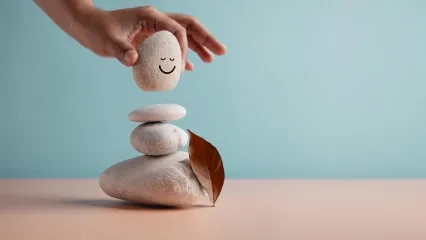Alo Yeditepe
Alo Yeditepe
Ways to Treat Anxiety Disorder Without Medication
Stating that distinguishing between normal anxiety and anxiety disorder is of great importance for our health, Yeditepe University Hospitals Specialist Clinical Psychologist Ayşe Nur İlbak Orhan explained the non-drug solutions to this common problem in our society as follows:
What is Anxiety?
Anxiety, as a word that is becoming increasingly widespread, is a concept that has become well-established in our language. Behind this widespread use lies the human need to make sense of uncertainties, to name and control the situation they are in. In other words, we can say that this need is actually based on anxiety and the motivation to calm anxiety. So, is the fact that so many people have been using the word anxiety recently due to the increase in anxiety-related problems in society, or is it because the concept has been internalised and the feeling is now expressed with a name rather than an uncertainty? Actually, both situations are possible.
Anxiety is an emotion developed against uncertainty, threats or dangers, emerging with the history of human existence on an evolutionary plane. It warns people both mentally and physically, keeps them alert against possible dangers and directs them to act or take precautions in this situation. Therefore, anxiety has a vital function.
Causes of Anxiety
The dangers, threats and uncertainties that trigger anxiety are diverse. There may be environmental factors such as natural disasters, pandemics, social uncertainties or crises, as well as internal causes such as anxiety about the future, insecurity, past relational traumas, worries about abandonment, failure or not being liked. The source of anxiety may arise from environmental or internal causes, but rather than the source of anxiety, the frequency and level of the person's experience of anxiety determines whether anxiety is a vital function or an anxiety disorder.
Many situations such as a job interview, an upcoming exam, difficult topics to talk about in relationships, separations, important changes, etc. activate our anxiety and make us make mental preparations related to the subject in order to feel safe. Making these preparations not only calms our anxiety, but also helps us to get through the process with minimal damage. When the situation that causes anxiety disappears, anxiety usually goes away on its own.
However, if anxiety takes over our mind to the extent that it prevents our mind from making preparations, it may cause us to be locked in, to feel only anxious, and to have difficulty with physical symptoms (trembling, sweating, stomach and intestinal problems, etc.).
Anxiety, which is severe and constant, can spread to all areas of a person's life rather than certain situations over time, and like the music in the background of a film, even if there is no threat or uncertainty, an anxiety that the person cannot make sense of the cause may continue to exist.
How to Deal with Anxiety?
Anxiety often arises from environmental or internal causes. In order to prevent anxiety from taking over our mind and life, it is very important to recognise and develop our internal resources and to be able to use these resources when needed..
What can happen between our internal resources;
Movement;
Physical activity improves mood and relieves anxiety by releasing endorphins in the body. In addition, exercise reduces stress hormones and creates a calmer state of mind. In case of anxiety, taking a walk outdoors or trying relaxing exercises can help to calm anxiety.
Sharing with people we trust;
Carrying anxiety alone can lead to further aggravation. Sharing our anxieties with people we love and trust can provide emotional support, help us to look at anxiety-related events from angles we cannot see, and we can hear good ways of coping that may not come to mind at that moment. Besides all this, talking about anxiety is a verbal expression. The verbal expression of what is going on inside can lighten the burden on the problem.
Making concrete plans for the situations that worry us;
The source of anxiety can be uncertainty. Creating concrete steps and plans can make it easier to manage anxiety. For example, in anxiety-provoking situations such as work or school, listing what needs to be done and following each step in order can reduce anxiety.
Paying attention to caffeine consumption;
Caffeine can produce stimulant effects in the body and increase the heart rate, which can trigger anxiety. Limiting daily caffeine intake is important for managing anxiety.
Eating healthy food;
Mind and body are interconnected and influence each other. Regular and balanced nutrition increases the body's capacity to cope with stress.
Maintaining self-care;
Kendimize zaman ayırmak ve rahatlatıcı aktiviteler yapmak (örneğin, banyo yapmak, meditasyon yapmak, yeterli uykuyu almak, dinlenmek) kaygıyı hafifletir. Özbakım, sadece fiziksel değil, zihinsel ve duygusal bakım anlamına gelir; kendinizi şefkatle ele almak kaygıyı dengelemenin güçlü bir yoludur.
Establish routines;
Daily routines can create a sense of security by removing uncertainty. Having and maintaining a morning routine, establishing a meal pattern or sleeping habits can help reduce anxiety. Routine relaxes the mind by making life more predictable.
Engage in the arts;
Creative activities are very beneficial for mental health. Engaging in the arts, such as painting, listening to music or playing an instrument, can reduce anxiety. Art is a powerful way of emotional expression and can help release stress. It was not a coincidence that activities such as mandala painting, which became widespread especially during the pandemic, increased. It has also been recognised that directing attention to art can help the mind to take a break and rest from uncertainties or threats, and thus has an important effect in calming anxiety..
Reduce screen use;
Constant exposure to social media and screens can increase mental fatigue and trigger anxiety. Anxiety is already a feeling triggered by stimuli. With intensive social media use or intensive screen use, our mind is exposed to too many stimuli in a very short time. Among the stimuli we are exposed to, we may also be exposed to issues that are already causing us anxiety, thus causing us to find ourselves in a feeling of anxiety again and again. Therefore, limiting screen time can lead to a calmer mind.
Is Anxiety Disorder Treatable?
The frequency and severity of anxiety, rather than its source, determine the course of anxiety. However, this does not mean that its source is unimportant. Anxiety can overwhelm us emotionally, physically and socially. Finding, applying and maintaining our internal resources that can help us cope can be difficult because the anxiety is so intense. The person may have statements such as ‘I am worried even when there is no reason why I can't do anything and I always feel like something bad is going to happen’.
If the person's quality of life has decreased, if the times when he/she feels balanced and peaceful have decreased, if he/she avoids doing what he/she wants to do by saying that he/she will get anxious, if he/she has sleep problems, if there are negative changes in his/her behaviour, if there are negative criticisms about himself/herself or despair, loss of motivation, if there are shortness of breath and palpitations due to sudden anxiety, if physical pains have increased, the person may no longer be living in a plane that manages his/her anxiety but is managed by his/her anxiety. At this point, the source of anxiety should be examined in depth with the support of a specialist.
Anxiety is a human energy source; it cannot and should not be eliminated. We can liken it to fuel for vehicles. If a vehicle has no fuel, it cannot set off, cannot travel, cannot reach its destination. Or using the existing fuel above the speed limit leads to loss of steering control, an accident or rapid depletion of the fuel. From this point of view, in psychotherapy we try to work out how we can use anxiety to our advantage, rather than trying to eliminate it. Depending on the level of anxiety, medication may be involved in the process in addition to psychotherapy.
This content was prepared by Yeditepe University Hospitals Medical Editorial Board.
Alo Yeditepe



